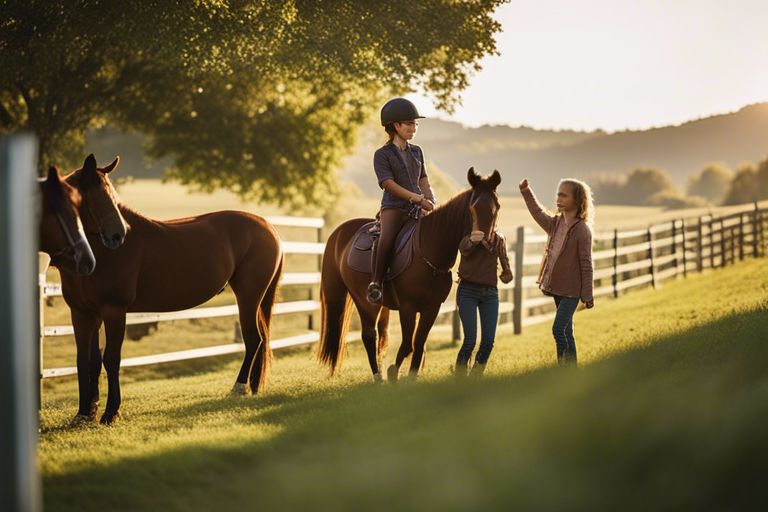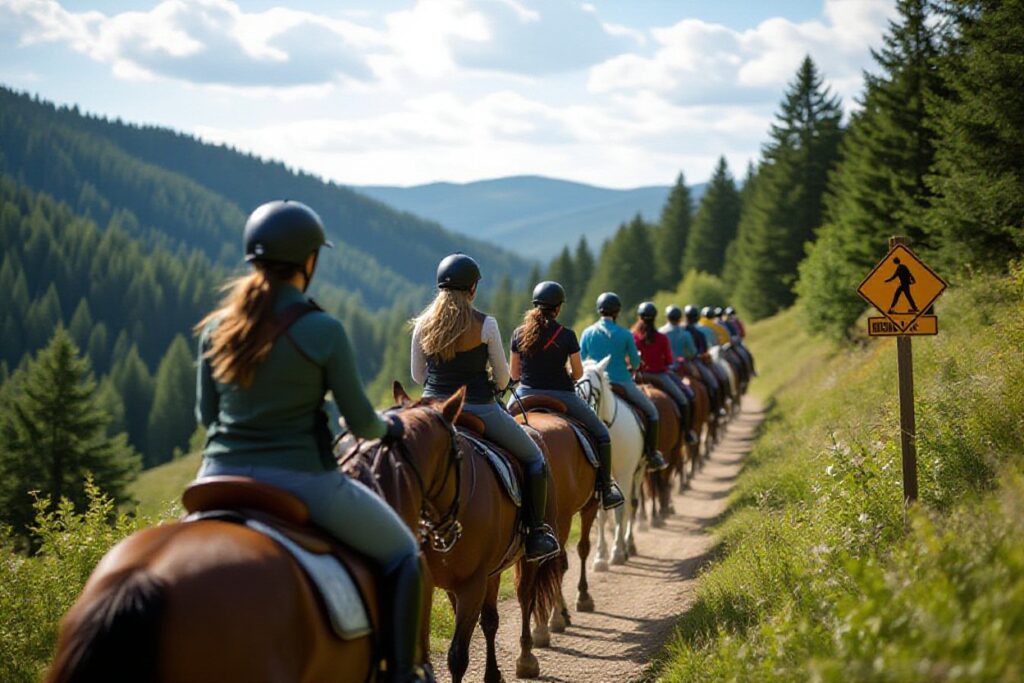This guide will walk you through planning, organizing, and executing a successful horse riding camp. From selecting qualified instructors to ensuring participant safety, you will learn the vital steps to create a fun and memorable experience for all attendees. Let’s get started on creating an unforgettable horse riding camp!
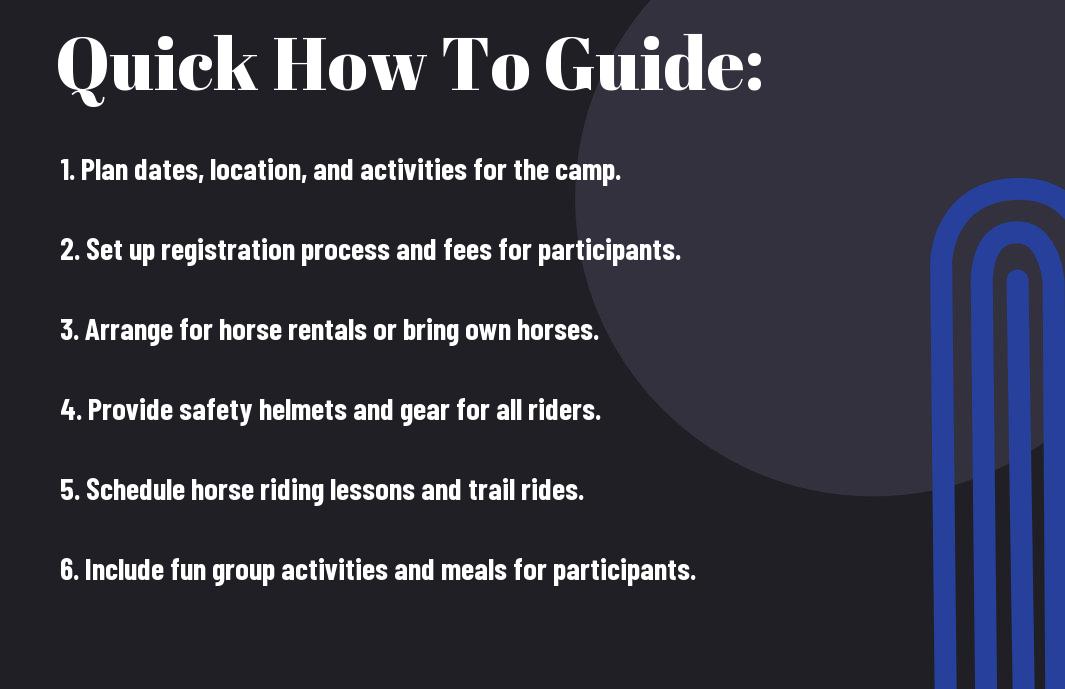
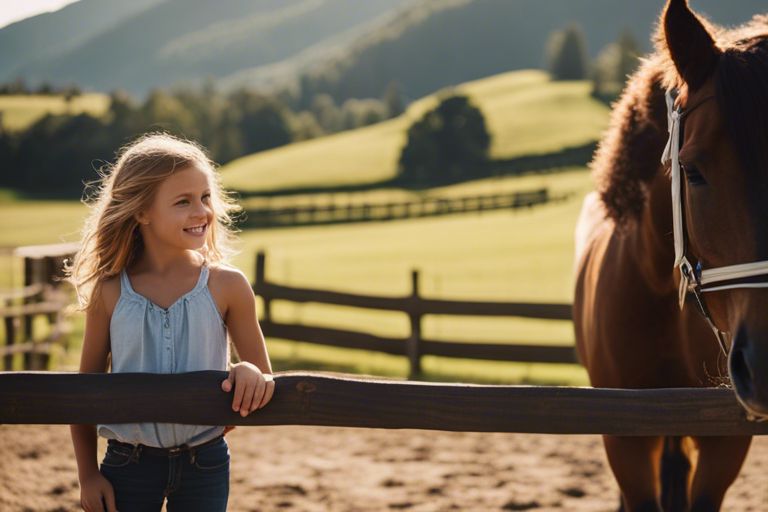
Planning and Preparation
Setting Clear Objectives and Goals for the Camp
Clear objectives and goals are vital for a successful horse riding camp. Define what you want participants to learn and achieve during their time at the camp. Set clear expectations for both riders and instructors to ensure a focused and productive experience. By establishing goals early on, you can tailor the program to meet the needs and expectations of all participants.
Choosing the Right Venue and Facilities
Some key factors to consider when selecting a venue for your horse riding camp include location, facility amenities, safety measures, and accommodation options. Ensure that the venue has appropriate stables, riding arenas, and access to trails for outdoor activities. Additionally, check that the facility can accommodate the number of participants and has vital safety measures in place.
Objectives such as having access to on-site medical facilities and emergency services are crucial for the well-being of riders and staff. Additionally, a positive and comfortable environment can enhance the overall experience for everyone involved.
Selecting Qualified Instructors and Staff
On top of having passionate and experienced instructors, it is vital to verify their qualifications and certifications to ensure they are capable of leading effective lessons. Qualified instruction can make a significant impact on the learning experience and safety of the campers. Consistent training and feedback for instructors can improve the overall quality of the camp.
Developing a Comprehensive Lesson Plan
Even though it’s important to have flexibility in your lesson plan, having a comprehensive structure is crucial to ensure that all skills and topics are covered. Include a mix of groundwork, riding lessons, and fun activities to engage participants and keep them motivated throughout the camp.
Venue safety protocols and emergency plans should be included in the lesson plan to prepare both instructors and participants for any unforeseen circumstances.
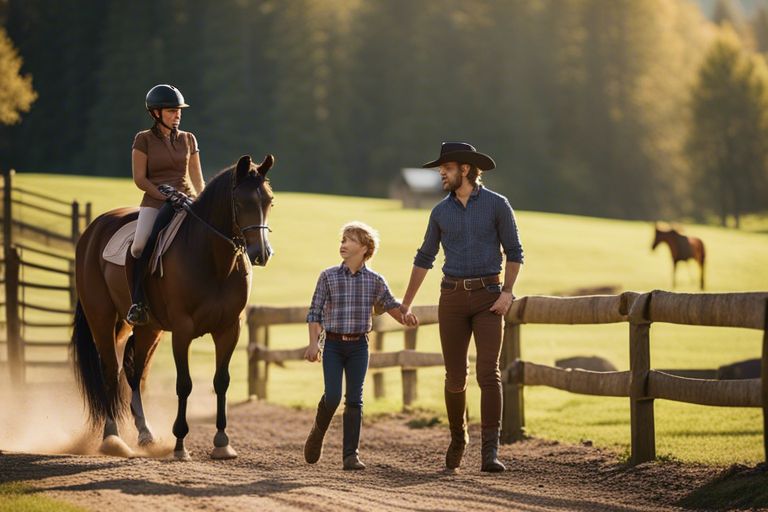
Pre-Camp Preparations
Horse Selection and Care
Some of the most crucial aspects of preparing for a horse riding camp involve horse selection and care. Now, it’s necessary to choose horses that are well-trained, gentle, and suitable for riders of all skill levels. Make sure the horses are in good health, with regular veterinary check-ups and proper nutrition. Provide adequate shelter, clean water, and daily exercise for the horses to ensure they are in top condition for the camp.
Equipment and Supply Checklist
Some of the key components in organizing a successful horse riding camp are the equipment and supplies you will need. To ensure you have everything you need, create a detailed checklist including items such as saddles, bridles, grooming tools, first aid kits, and helmets. Having a well-stocked supply of necessarys will ensure smooth operations and timely responses to any situations that may arise.
To make sure you have all the necessary equipment, double-check your inventory and consider any specific requirements based on the activities planned during the camp. This will help you address any potential issues beforehand and provide a safe and enjoyable experience for all participants.
Safety Protocols and Emergency Procedures
To ensure the well-being of your campers and staff, thorough safety protocols and emergency procedures must be in place. Supply your team with the necessary training on how to handle emergencies, such as fall-offs, spooked horses, or inclement weather. Have a designated safety officer who can oversee operations and respond quickly to any issues that may arise.
Preparations should also include conducting safety briefings for all participants at the beginning of the camp. Clearly communicate rules, expectations, and emergency procedures to everyone involved to ensure a safe and secure environment throughout the camp.
Marketing and Promotion Strategies
Selection of appropriate marketing and promotion strategies can significantly impact the success of your horse riding camp. Preparations should include creating an engaging website, utilizing social media platforms, and collaborating with local horse riding clubs or schools to reach your target audience. Offering early bird discounts, referral incentives, or hosting open house events can also help generate interest and boost registrations.
To ensure a successful camp, it’s necessary to focus on building a strong online presence and engaging with potential participants through various marketing channels. Implementing a strategic marketing plan will help you reach a wider audience and attract enthusiastic riders to your camp.
Camp Structure and Scheduling
Creating a Daily Schedule and Routine
Schedule your horse riding camp days with a structured routine to ensure a smooth flow of activities. Many campers thrive on a consistent schedule, so creating a daily plan can help keep everyone on track. Start with morning activities such as grooming and feeding the horses, followed by riding lessons and specific skill-building exercises. Plan for rest times and meals to keep energy levels up and ensure everyone stays refreshed throughout the day.
Organizing Horse Riding Sessions and Activities
For a successful horse riding camp, it’s crucial to organize horse riding sessions and activities based on the skill levels of the campers. Pair riders with horses that match their abilities, and plan a variety of activities such as trail rides, jumping exercises, and dressage practice. This will keep the camp engaging and challenging for all participants, allowing them to grow their skills in a supportive environment.
This approach will help keep the campers excited about learning and progressing in their riding abilities. Organizing structured sessions will not only improve their horse riding skills but also build their confidence and connection with the horses.
Incorporating Theory and Educational Components
Schedule some time during the horse riding camp to incorporate theory and educational components into the program. This could include teaching campers about horse care, grooming techniques, basic equine anatomy, and even horse behavior. Understanding the theoretical aspects of horse riding can enhance the campers’ overall experience and deepen their connection with the horses.
Plus, incorporating educational components provides a well-rounded learning experience that goes beyond just riding skills. It helps campers develop a deeper appreciation for the equestrian world and equips them with valuable knowledge that they can apply in their future horsemanship endeavors.
Scheduling Breaks and Downtime
Any well-planned horse riding camp should include scheduled breaks and downtime to prevent exhaustion and allow campers to recharge. Incorporating breaks between riding sessions gives everyone a chance to rest, hydrate, and relax before moving on to the next activity. Balancing active riding time with relaxation periods ensures that both campers and horses stay energized and focused throughout the camp.
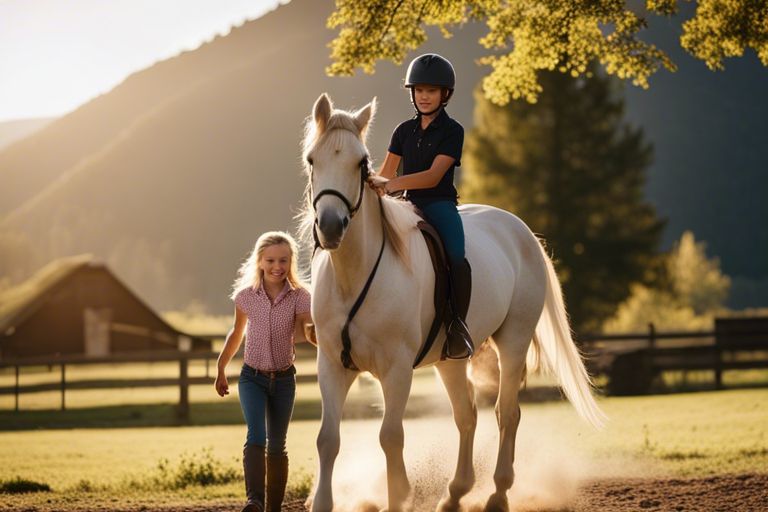
Essential Tips for a Successful Camp
Once again, when organizing a horse riding camp, there are several key factors to consider for a successful experience. Here are some imperative tips to keep in mind:
- Building Trust and Confidence with Riders: There’s no doubt that building trust and confidence with your riders is crucial for a successful camp. Make sure to create a positive and supportive environment where riders feel safe and encouraged to step out of their comfort zones. This will help them grow as equestrians and make the camp a rewarding experience for all.
- Managing Different Riding Levels and Abilities: Riders come to camp with varying levels of experience and skill. Riders must be placed in appropriate groups or activities based on their abilities to ensure everyone is challenged but not overwhelmed. This will help maintain a safe and enjoyable environment for all participants.
Building Trust and Confidence with Riders
There’s no doubt that building trust and confidence with your riders is crucial for a successful camp. Make sure to create a positive and supportive environment where riders feel safe and encouraged to step out of their comfort zones. This will help them grow as equestrians and make the camp a rewarding experience for all.
Managing Different Riding Levels and Abilities
Riders come to camp with varying levels of experience and skill. It’s imperative to assess their abilities accurately and group them accordingly. Tips for managing this include offering different activities or classes based on skill level, providing individual attention when needed, and ensuring that no one feels left behind or held back.
Encouraging Teamwork and Camaraderie
Abilities to work together and support one another are key aspects of a successful camp experience. Encouraging teamwork through group activities, team challenges, and shared responsibilities can help foster a sense of camaraderie among participants. Plus, teamwork can also enhance the overall learning experience and create lasting friendships among riders.
Providing Feedback and Evaluation
Encouraging feedback is imperative for riders to improve their skills and grow as equestrians. Providing constructive criticism in a positive and supportive manner can help riders understand their strengths and areas for improvement. Riding instructors should also conduct regular evaluations to track progress and set goals for each participant.
Key Factors to Consider
Not all horse riding camps are created equal. When organizing a camp, considering several key factors can help ensure a successful and safe experience for all participants.
Age and Experience of Riders
Factors such as the age and experience of the riders play a crucial role in determining the activities and level of supervision required during the camp. You need to assess the skill level of each participant to group them appropriately and tailor the riding sessions to their abilities. The safety and enjoyment of the riders depend greatly on this factor.
Horse Temperament and Behavior
Consider the temperament and behavior of the horses that will be used in the camp. This is imperative in matching the right horse to each rider based on their skills and confidence level. You must ensure that the horses selected are well-trained, gentle, and suitable for riders of varying abilities.
Weather and Environmental Conditions
Riders are greatly influenced by the weather and environmental conditions during the camp. Behavior of both horses and riders can be affected by extreme temperatures, rainfall, or strong winds. Proper planning and having alternative activities in place can help you adjust the schedule accordingly to ensure the safety and comfort of everyone involved.
Safety Regulations and Industry Standards
There’s no compromise when it comes to safety in horse riding camps. Adhering to safety regulations and industry standards is crucial to protect both riders and horses. Regular equipment checks, qualified instructors, and emergency response plans are all imperative components in maintaining a safe environment for your campers.
Overcoming Common Challenges
Managing Rider Fears and Anxieties
Despite your best efforts to create a safe and welcoming environment, some riders may still experience fears and anxieties when horse riding. It’s imperative to address these concerns with empathy and understanding. Encourage open communication with your campers to help them express their fears and provide support to help them overcome them. Offering additional training sessions or one-on-one instruction can help boost their confidence and make them feel more comfortable on horseback.
Dealing with Inclement Weather
Anxieties about dealing with inclement weather during a horse riding camp are common. It’s important to have a contingency plan in place in case of rain or storms. Make sure you have access to indoor facilities or covered areas where activities can continue if the weather turns unfavorable. Keep an eye on weather forecasts and be prepared to modify the schedule to ensure the safety of all camp participants.
Handling Horse Misbehavior and Accidents
To effectively handle horse misbehavior and accidents during your camp, you should have a clear set of safety rules and procedures in place. Ensure that all staff members are trained in basic first aid and know how to respond in case of an emergency. Regularly inspect and maintain your equipment and facilities to prevent accidents caused by faulty gear or infrastructure.
Maintaining Staff Morale and Motivation
Anxieties may arise among your staff during a horse riding camp, especially when dealing with challenges or incidents. It’s crucial to provide ongoing support and recognition for their hard work. Organize team-building activities and training sessions to help boost morale and keep everyone motivated throughout the camp. Encourage open communication and feedback to address any concerns or issues that may arise.
Conclusion
With this in mind, organizing a successful horse riding camp requires careful planning and attention to detail. By following the steps outlined in this guide, you can ensure that your camp runs smoothly and that participants have a safe and enjoyable experience. Remember to prioritize safety, communicate effectively with staff and participants, and provide a well-rounded program that caters to riders of all skill levels.
Whether you are hosting a day camp or a week-long retreat, creating a positive and supportive environment for your campers is key. By offering quality instruction, fun activities, and opportunities for personal growth, you can make your horse riding camp a memorable and rewarding experience for all involved. With the right preparation and dedication, you can create a camp that fosters a love of horses and riding in participants of all ages.
Q: What is the ideal location for conducting a horse riding camp?
A: The ideal location for conducting a horse riding camp should be a spacious area with access to horse trails, open fields for riding, and facilities for stabling and grooming the horses.
Q: What are the necessary safety precautions to take during a horse riding camp?
A: Safety is paramount in horse riding camps. Ensure all participants wear helmets, provide proper instructions on mounting and dismounting, have experienced staff present at all times, and conduct regular horse health checks.
Q: What activities should be included in a horse riding camp itinerary?
A: A well-rounded horse riding camp should include riding lessons, trail rides, grooming and tacking sessions, educational workshops on horse care, and fun activities such as horse-themed games and competitions.
Q: How should participants be grouped during a horse riding camp?
A: Participants should be grouped based on their riding experience and skill level. This ensures that each group receives tailored instruction and supervision appropriate for their abilities.
Q: What qualifications should the instructors have for a horse riding camp?
A: Instructors for a horse riding camp should have certified training in horse care and riding instruction. They should also have experience working with children and be knowledgeable about horse behavior and safety practices.
